
 SECOND VESPERS:
SECOND VESPERS:
Feast of the Conversion of St. Paul
Conclusion of the Week of Prayer for Christian Unity
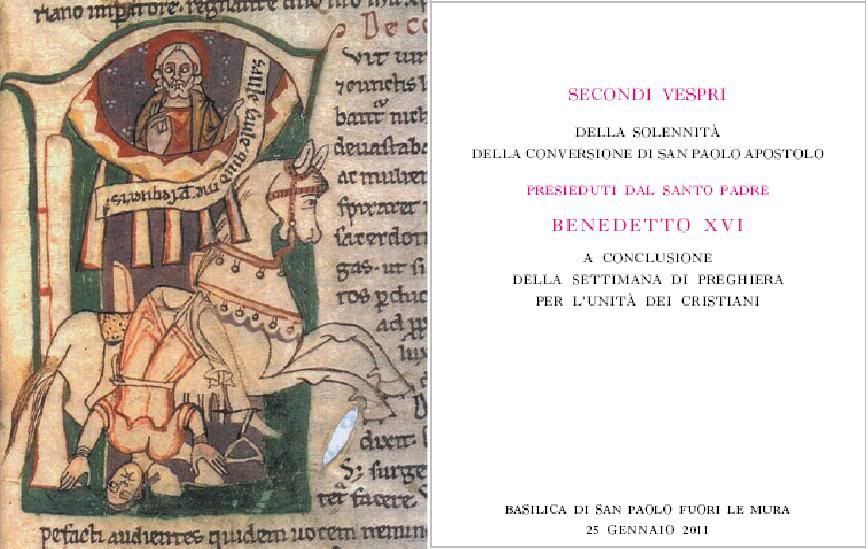
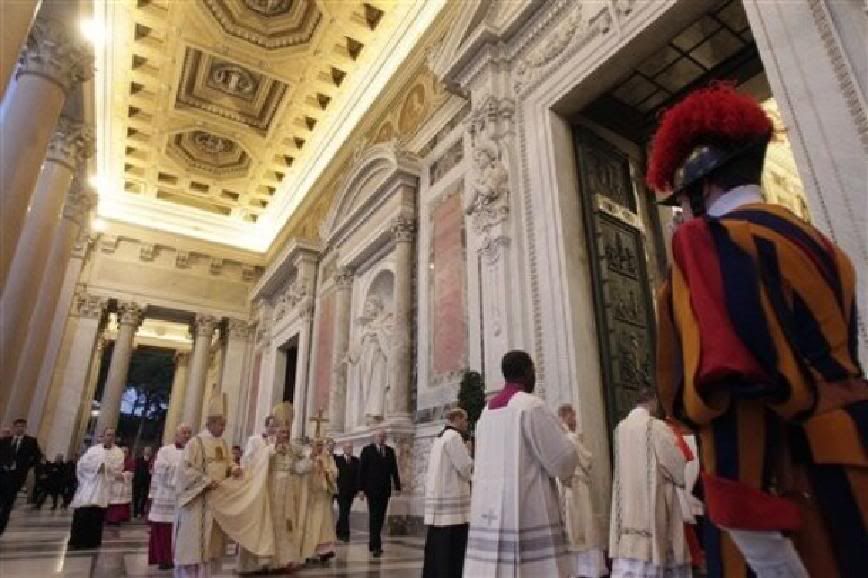
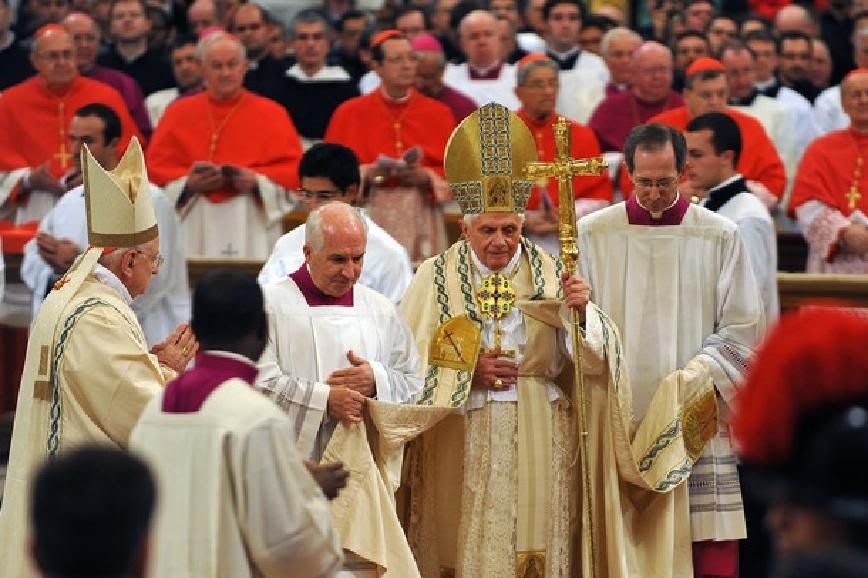
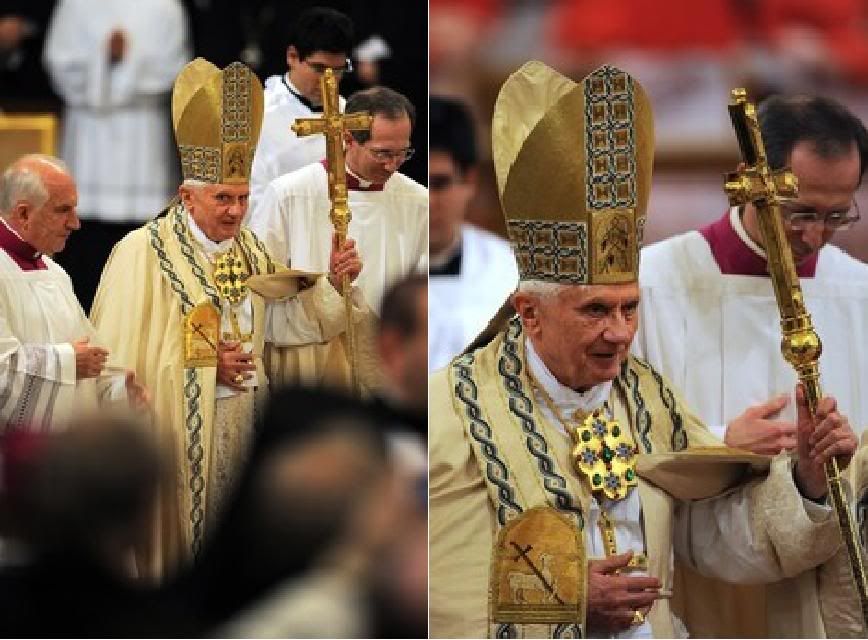
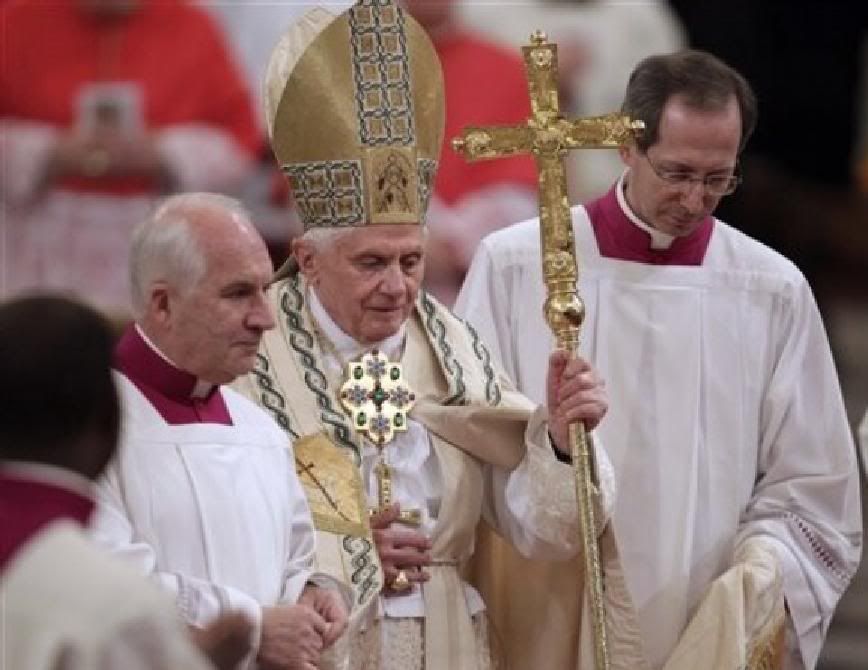
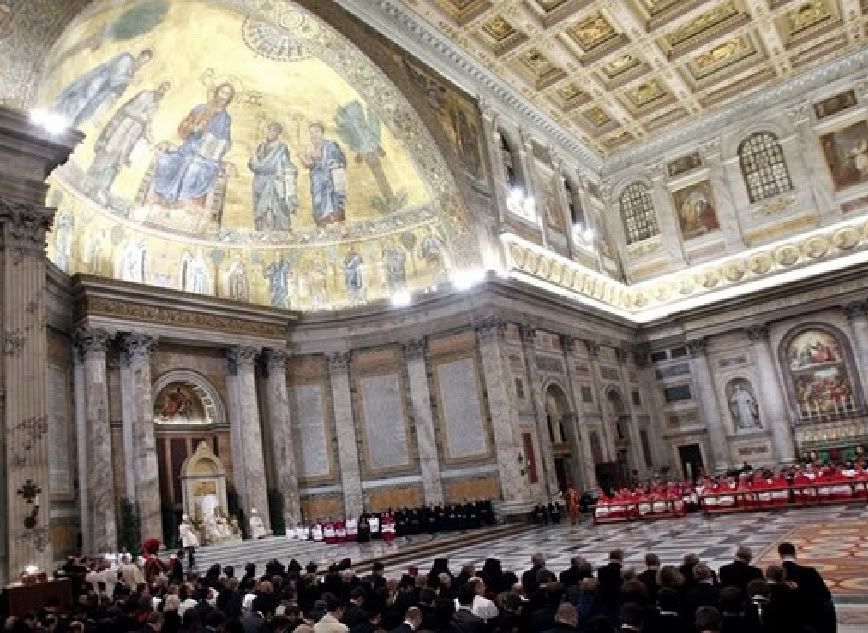 Search for Christian unity
Search for Christian unity
is 'moral imperative,' Pope says
By Cindy Wooden

ROME,Jan. 25 (CNS) -- Giving in to the temptation of thinking the Christian churches will never be fully united is a sign of weak faith, Pope Benedict XVI said today,
"One must resist the temptation of resignation and pessimism, which is a lack of trust in the power of the Holy Spirit," the Pope said Jan. 25 at an ecumenical evening prayer service marking the close of the Week of Prayer for Christian Unity.
The Pope presided over the service at Rome's Basilica of St. Paul Outside the Walls with a German Lutheran delegation, an international group of Oriental Orthodox bishops and theologians, and Orthodox, Anglican and Protestant leaders from Rome.
Special prayers were read by Orthodox Metropolitan Gennadios of Italy and Malta, and by the Rev. David Richardson,director of theAnglican Center of Rome, who represented the Anglican archbishop of Canterbury.
In his homily, the Pope said the search for Christian unity is "a moral imperative, a response to a precise call of the Lord."
The theme of the 2011 week of prayer, "One in the apostles' teaching, fellowship, breaking of bread and prayer," described the unity experienced within the early Christian community, the Pope said.
The early Christian community in Jerusalem "was not closed in on itself, but from its birth it was catholic, universal, capable of embracing people of different languages and cultures," the Pope said.
"It was a community not founded on a pact among its members, or on the simple sharing of a project or ideal, but on profound communion with God," he said.
Pope Benedict repeated what he had said Jan. 19 during his weekly general audience at the Vatican: The theme's four ingredients are the four pillars of Christian faith and are "the fundamental dimensions of unity of the visible body of the church."
To be fully united, he said, Christians must hold firm to the faith taught by the apostles, they must gather together, they must share the Eucharist, and they must pray constantly.
Because unity must be based on faith believed and lived in common, he said at the prayer service, Christian unity cannot be reduced to a recognition and acceptance of differences and an agreement to coexist peacefully.
"That for which we yearn is the unity for which Christ himself prayed and which, by its nature, is manifested in a communion of faith, sacraments and ministry," Pope Benedict said.
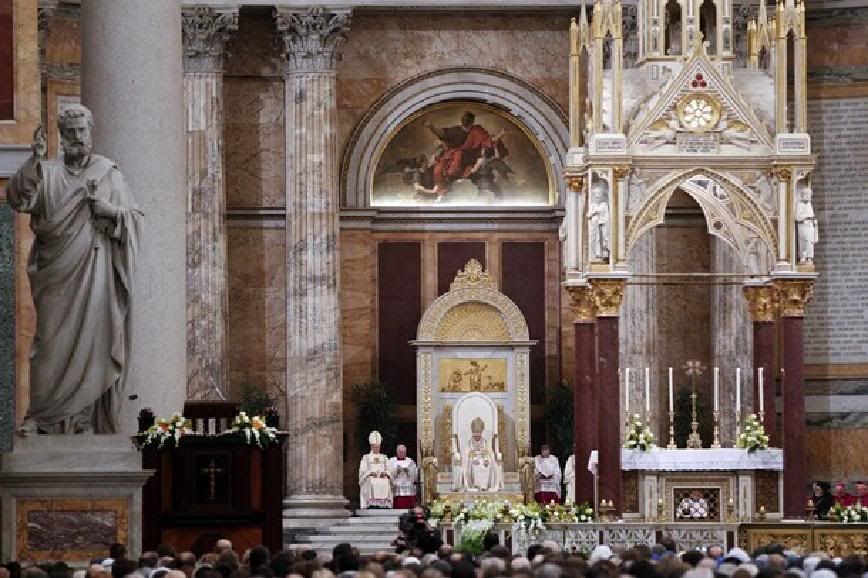
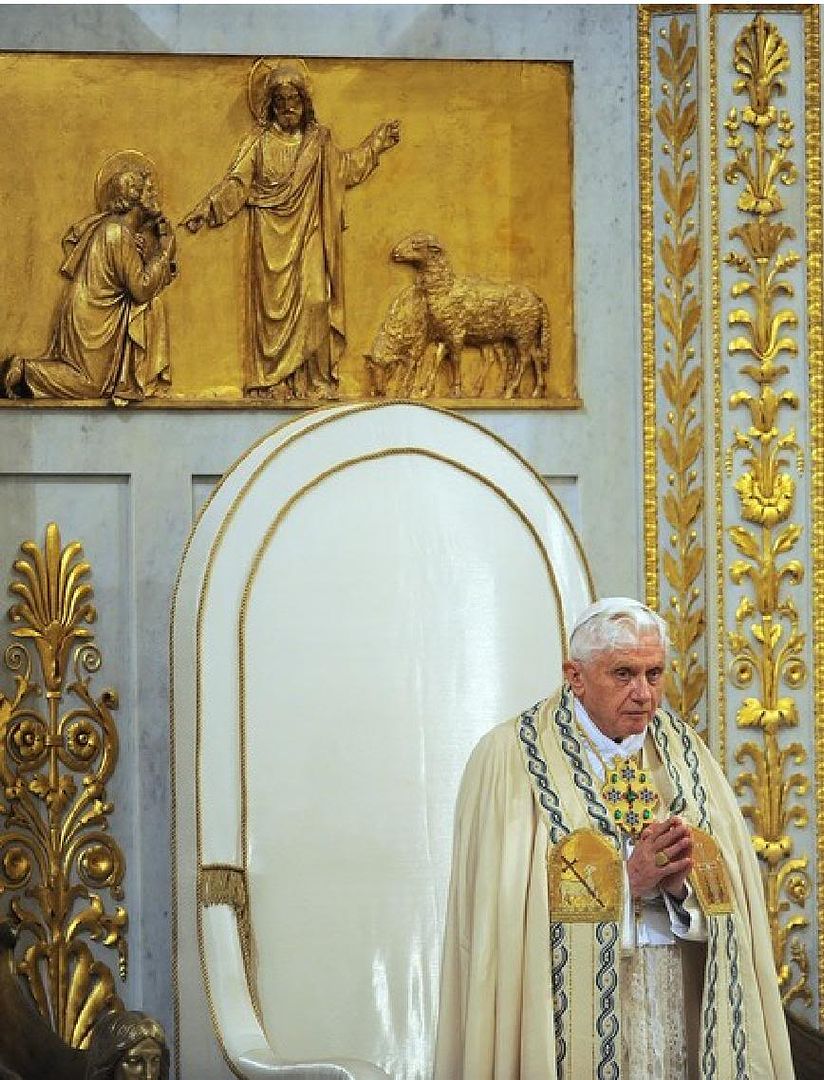
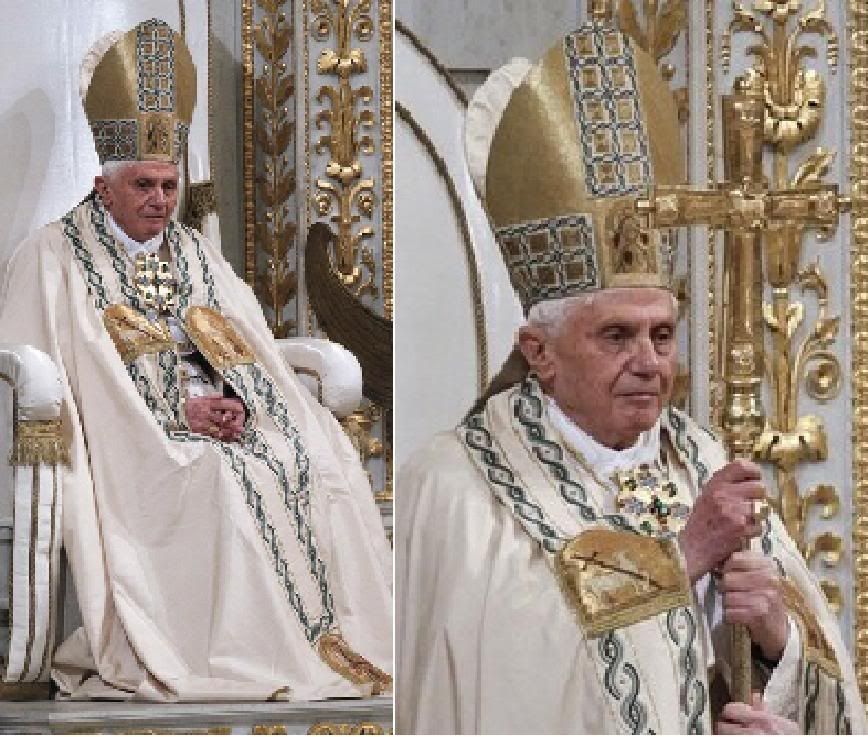
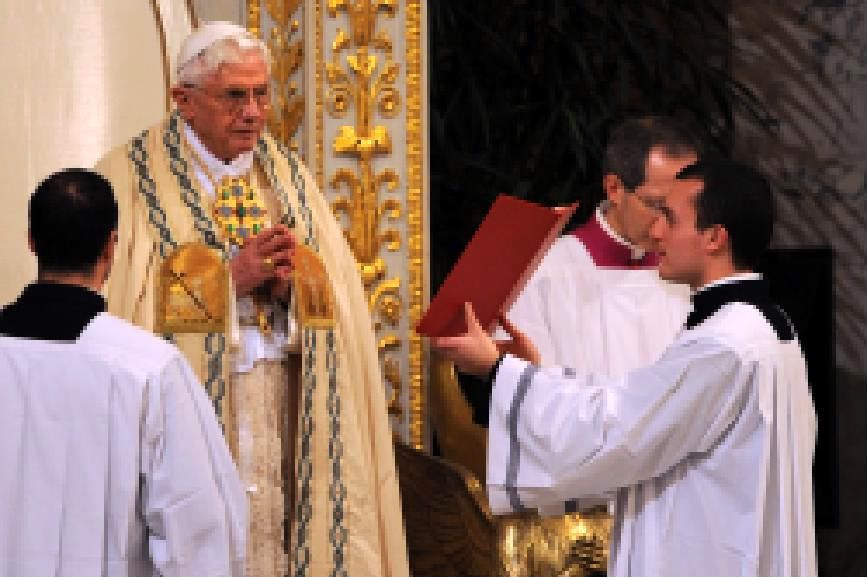 Here is a translation of the Holy Father;s homily:
Here is a translation of the Holy Father;s homily:
Dear brothers and sisters:
Following the example of Jesus, who on the eve of his Passion prayed to the Lord for his disciples, "so that all may be one" (Jn 17,21), Christians continue incessantly to invoke God for the gift of unity.
This requesr becomes more intense during the Week of Prayer which ends today, when the Churches and ecclesial communities meditate and pray together for the unity of all Christians.
This year, the theme offered for our meditation was proposed by the Christian communities of Jerusalem, to whom I wish to express my sincere gratitude, with assurances of my affection and prayers, both on my part and of the Church.
The Christians of the Holy City invite us to renew and strengthen our commitment for the re-establishment of full unity, meditating on the model of living shown by the first disciples of Christ gathered in Jerusalem: "They devoted themselves to the teaching of the apostles and to the communal life, to the breaking of bread, and to prayers" (Acts 2, 42).
This is the picture of the first community born in Jerusalem on the day of Pentecost, inspired by the preaching of the Apostle Peter, filled with the Holy Spirit, and open to all those who had come to the Holy City for the holiday.
A community that was not closed in itself but, from its very birth, was catholic, universal, capable of embracing people of different languages and cultures, as the book of the Acts of the Apostles tells us.
A community that was not founded on a pact among its members, nor out of simple sharing of a plan or an ideal, but on profound communion with God, who had revealed himself in his Son - from the encounter with Christ who had died and was resurrected.
In a brief summary, which concludes the chapter that begins with the narration of the descent of the Holy Spirit on the day of Pentecost, the evangelist Luke presents syhthetically the life of this first community:
Those who listened to the word preached by Peter and were baptized, listened to the Word of God transmitted by the Apostles. They stayed together gladly, taking charge of necessary services and sharing their material goods freely and generously.
They celebrated the sacrifice of Christ on the Cross, the mystery of his death and resurrection, in the Eucharist, repeating the gesture of breaking bread. They praised and thanked the Lord continually, invoking his help in difficulties.
But this description is not simply a recollection of the past nor the presentation of an example to imitate or of an ideal goal to reach. It is above all an affirmation of the presence and action of the Holy Spirit in the life of the Church. It is an attestation, full of trust, that the Holy Spirit, uniting everyone in Christ, is the principle of unity of the Church and makes of all believers one thing only.
The teachings of the Apostles, their fraternal communion, the breaking of bread and prayer, are the concrete forms of life of the first Christian community of Jerusalem, united by the action of the Holy Spirit, but at the same time, these constitute the essential traits of all Christian communities, of every time and every place.
In other words, we can say that they represent the fundamental dimensions of unity in the visible Body of the Church.
We should acknowledge that in the last few decades, the ecumenical movement, "emerging by impulse of the grace of the Holy Spirit" (Unitatis redintegratio, 1), has made significant steps forward which have made possible encouraging convergences and consensus on various points, which has led to relationships of esteem and reciprocal respect among the Churches and ecclesial communities, as well as of concrete collaboration in confronting the challenges of today's world.
But we also know very wellt hat we are still far from that unity which Christ prayed for and which we find reflected in the picture of the first Christian community of Jerusalem.
The unity to which Christ, through the Spirit, calls the Church is not to be realized only on the level of organizational structures, but shall be configured at a more profound level, as unity expressed "in the confession of one single faith, in the common celebration of divine worship, and in the fraternal concord of the family of God" (ibid., 2).
The search for teh re-establishment of unity among divided Christians can therefore not be reduced to a recognition of reciprocal differences and to achieving peaceful coexistence. What we yearn for is the unity that Christ himself prayed for and which, by its nature, is manifested as a communion of faith, of the sacraments, of ministry.
The journey towards this unity must be seen as a moral imperative, responding to a precise call by the Lord. For this, we must overcome the temptation of resignation and pessimism, which is a lack of confidence in the power of the Holy Spirit.
Our duty is to continue along this road to our goal with passion, with serious and rigorous dialog to look into our common theological, liturgical and spiritual patrimony; with reciprocal knowledge; with the ecumenical formation of the new generations; and above all, through the conversion of the heart and with prayer.
In fact, as the Second Vatican Council declared, "The holy purpose of reconciling all Christians in the unity of the one and only Church of Christ, goes beyond human powers and gifts" and therefore, our hope must be placed first of all "in Christ's prayer for the Church, the love of the Father for us, and in the power of the Holy Spirit (ibid.,24).
In this quest for full visible unity among all Christians, we are acocmpanied and sustained by the Apostle Paul, whose conversion we celebrate solemnly today. He - before the Risen Lord appeared to him on the road to Damascus, saying "I am Jesus whom you persecuted" (Acts 9,5)] - had been one of the most persistent adversaries of the first Christian communities.
The evangelist Luke describes Saul as among those who had approved the killing of Stephen in the days when violent persecution erupted against the Christians of Jerusalem (cfr Acts 9,1). From the Holy City, Saul left to extend the persecution of Christians to Syria, and after his conversion, he would return to Jerusalem to be introduced to the Apostles by Barnabas, who guaranteed the authenticity of Paul's encounter with the Lord.
From then on, Paul was admitted not only as a member of the Church but as a preacher of the Gospel along with the Apostles, having received, like them, the manifestation of the Risen Lord and his special call to be 'the chosen instrument' to bring his name to all peoples (cfr Acts 9,15).
In his long missionary journeys, Paul, travelling through different cities and regions, never forgot his bond of communion with the Church of Jerusalem. Collecting money for the Christians of that community who soon needed to be helped (cfr 1Cor16,1), occupied an important part of Paul's concerns, who considered it not just an act of charity, but also the sign and guarantee of the unity and communion among the churches he set up and that primitive community in the Holy City - a sign of unity in the only Church of Christ.
In this atmosphere of intense prayer, I wish to extend my cordial greeting to everyone present: to Cardinal Crancesco Monterisi, arch-priest of this Basilica; to Cardinal Kurt Koch, president of the Pontifical Council for Promoting Christian Unity; to the other cardinals; my brothers in the episcopate and priesthood; the abbot and the Benedictine monks of this ancient community; the religious and lay people who represent the enture diocesan community of Rome.
I especially greet the brothers and sisters from the other Churches and ecclesial communities who are represented here this evening. Among them, it is a particular pleasure to greet the members of the Mixed International Commission for Theological Dialog between the Catholic Church and the Eastern Orthodox Churches, who are meeting in Rome these days.
We entrust to the Lord the success of your meeting, so that it may represent another step forward towards that unity we all wish for.
In German, he said:
I wish to extend a special greeting to the representatives of the United Evangelical Lutheeran Churches of Germany who are in Rome under the leadership of the Bavarian bishops.
He concluded in Italian:
Dear brothers and sisters, trusting in the intercession of the Virgin Mary, Mother of the Church, let us therefore invoke the gift of unity. Toether with Mary, who on the day of the Pentecost was in the Cenacle with the Apostles, let us address God, the source of every good, so that he may renew for us today the miracle of Pentecost, in order that, guided by the Holy Spirit, all Christians may re-establish their full unity in Christ. Amen.
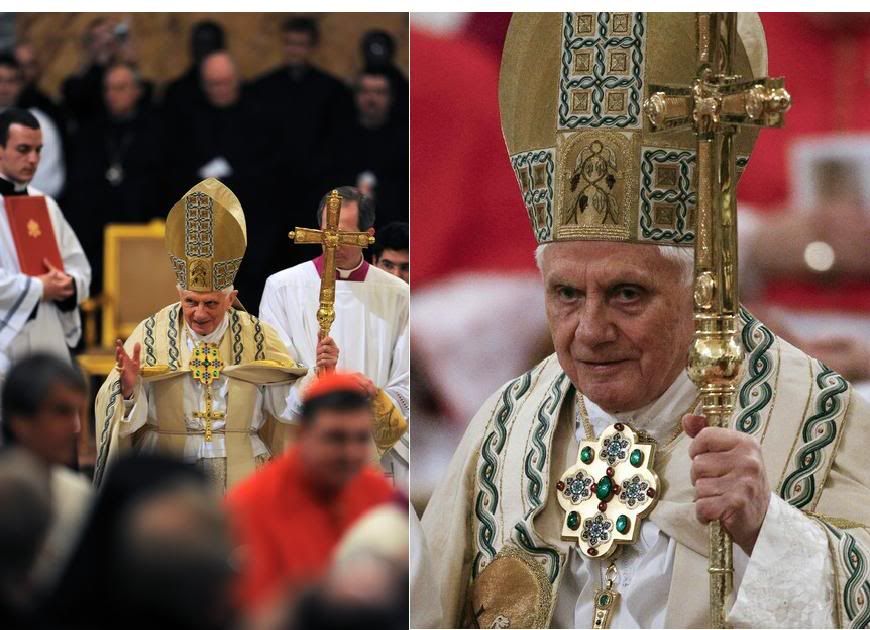
[Modificato da TERESA BENEDETTA 26/01/2011 17:42]